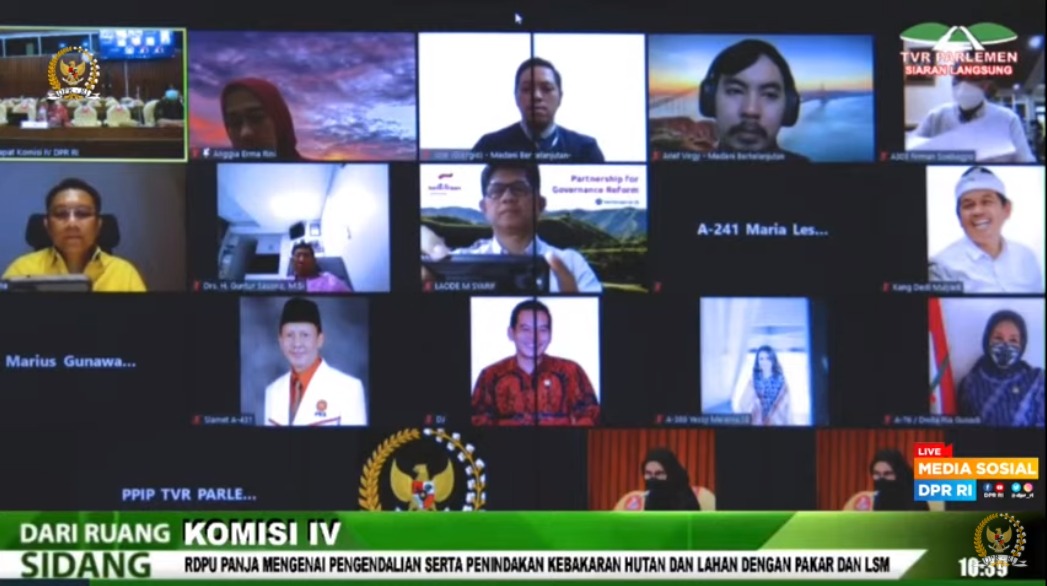
Forest and land fires in Indonesia are not something new, and always repeated every year. However, compared to previous years, in the last two or three years our forest fires have been relatively more under control. This is one of the conclusions from the presentation delivered by the Executive Director of KEMITRAAN, Laode M. Syarif, during a public hearing with the Working Committee for the Control and Enforcement of Forest and Land Fires – Commission IV of the House of Representatives on June 28th 2021.

According to him, forest and land fires were carried out intentionally, “It is impossible for the forest to burn without being burned.” And this is also according to a figure known as a former commissioner of the KPK, and President has realized. “President looks serious, as a forestry scholar said to him, that the main cause of forest fires was the work of a company. The second is the community, and the third is the element, because of economic motives and through land clearing by burning,” he explained in front of the chairperson of the session and other sources who were present online and offline in the meeting room.
The decline in the number of forest and land fires is influenced by several policies, one of which is the moratorium on granting permits. However, according to the figure who is also known as an environmental law expert, to reduce the number of forest and land fires, it is also necessary to improve its governance. Especially changing the paradigm by prioritizing a prevention approach. So far, forest and land fires often occur because the approach taken by the government is reduction, not prevention. This can be seen from the nature of the use of funds at BNPB which can only be used when a fire has occurred, or is on-call and causes a larger proportion of the use of funds on prevention. “Therefore, we must focus on efforts to prevent it, not extinguish it,” he explained.
Based on the findings of KEMITRAAN in the field, the large firefighting budget tends to be unable to extinguish fires, especially on peatlands. In many of the KEMITRAAN’s assisted locations, the fires did not really die out after it rained. The next problem, according to Syarif, is the division of authority that places forestry issues at the provincial level, and even according to Job Creation Law being at the center can make prevention programs difficult, because it relates to the budgeting system. Meanwhile, the problem of forest burning occurs in districts/cities, and even villages.
Therefore, he asked the members of Parliament to make a policy that allows access to the village to access prevention funds. “So please members of Parliament, don’t raise blackout money, but prevent it. And the prevention money must be accessible up to the site,” he hoped.
The next improvement that must be improved is in terms of law enforcement, especially for corporations that have not run optimally. According to him, law enforcement officers from the police and prosecutors have so far not paid attention to the issue of forest and land fires, while the KLHK Gakkum (Law Enforcement-Ministry of Environment and Forestry) has limited ability to handle cases throughout the country.
Another issue that is no less important to improve is the policy on the use of village funds. Minister Of Village, Development Of Disadvantage Region, and Transmigration Regulation No.13/2020 allows the use of the Village Fund budget for disaster management including forest and land fires, but the Minister of Home Affairs Regulation No.20/2018 concerning Village Financial Management does not provide a specific budget code for the prevention and management of forest and land fires.
According to Sharif, prevention policies need to be supported by the Parliament by way of guarding the consistency of government policies. Because even though Presidential Instruction No.11/2015 and Presidential Instruction No.3/2020 mention that the prevention of forest and land fires includes aspects of prevention, suppression and post-fire handling, in practice control efforts are still more focused on extinguishing.
In front members of Commission IV of the House of Representatives and other speakers, such as Prof. Dr. Ir. Bambang Hero, M.Agr; Prof. Dr. Ir. Azwar Maas, M.Sc.; and representatives from the Madani Berkelanjutan Foundation, GreenPeace Indonesia, and Kaoem Telapak, Syarif offered several suggestions for improvement. Among these significantly improve the program and budget for prevention activities, such as: the construction of artesian wells, supply of equipment, wetting peatlands, strengthening patrol, early detection systems, and other prevention programs at the level of the tread.
.png)
Parliament also needs to make regulations that allow the provision of funds for preventing forest and land fires to significant districts/cities and villages to make prevention programs, including as part of strengthening the involvement of community elements in the regions. One of them, by providing support for operational costs and a sustainable financing system to Caring Society of Fire in the village.
Parliament needs to encourage the government to promote land management practices without fuel (thermal power station) as one of the alternatives offered to farmers and significant incentives to people who want to implement a system of thermal power stations (aid mechanization for land management, development of wetland farming systems and others).
Recently, the parliament, according to Syarif, needs to push regulations in terms of asset freezing and execution of court decisions that have been committed to companies that are proven to have burned forests and land.
Watch in full the participation of KEMITRAAN in the General Hearing Meeting of Deforestation with Commission IV of the House of Representatives.






